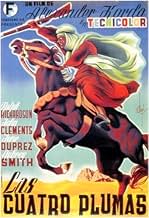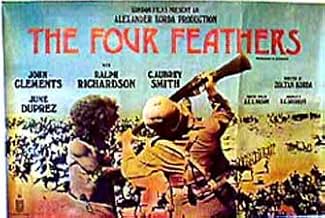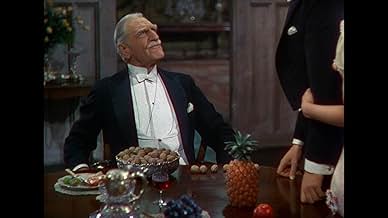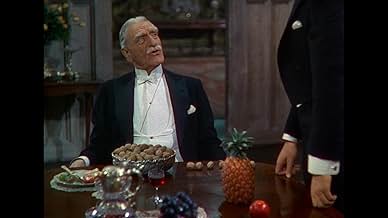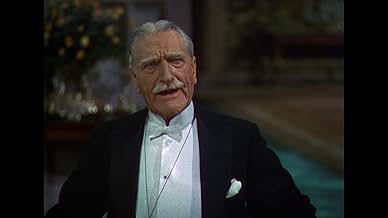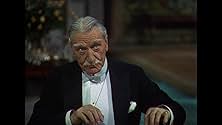Aggiungi una trama nella tua linguaA British Army officer resigns, burning his last-day summons to war in the Sudan. Accusing him of cowardice, his girlfriend and three friends give him white feathers. To gain redemption, he ... Leggi tuttoA British Army officer resigns, burning his last-day summons to war in the Sudan. Accusing him of cowardice, his girlfriend and three friends give him white feathers. To gain redemption, he shadows his friends to save their lives.A British Army officer resigns, burning his last-day summons to war in the Sudan. Accusing him of cowardice, his girlfriend and three friends give him white feathers. To gain redemption, he shadows his friends to save their lives.
- Regia
- Sceneggiatura
- Star
- Premi
- 1 vittoria e 2 candidature totali
- Man
- (non citato nei titoli originali)
Recensioni in evidenza
This is the best version of A.E.W Mason novel and contains a plethora of adventures , heroism, a love story and breathtaking battles. John Clemens as brave hero is memorable and Jane Duprez as gorgeous heroine is charming . Ralph Richardson as the blind comrade is awesome . Touch of humor is supplied by C. Aubrey Smith as the resourceful veteran military . Special mention to cinematography in a colorful and glimmer Technicolor at charge of George Perinal . Spectacular musical score by the classic musician Miklos Rozsa . The film has been magnificently realized by Korda brothers , Zoltan (direction) , production design (Vincent) and production (Alexander Korda). Other versions of Mason novel are ¨Storm over the sand¨ (1955) by Terence Young with Laurence Harvey, Anthony Steel and Mary Ure ; 1977 Television remake with Beau Bridges , Robert Powell and Jane Seymour and last adaptation (2000) by S. Kapoor with Heath Ledger , Wes Bentley and Kate Hudson . The motion picture will appeal to adventure genre fans and classic cinema enthusiasts .
June Duprez is the scornful woman, pretty as a picture in the only feminine role. Uncharismatic British actor John Clements is only adequate as the man who receives the "four feathers" and must redeem himself--but Ralph Richardson has the most memorable scenes as the sun-struck soldier who loses his helmet under the blazing sun and is blinded. Many gripping scenes as the hero undertakes a long journey to the Sudan.
Handsome Alexander Korda production rightfully deserves its ranking as a screen classic of 1939, but I have to say it's not without its faults as far as the structure of the story goes.
First of all, too much time is spent on hundreds of extras in battle scenes that become repetitious after awhile and interrupt the flow of the story and what is happening with our hero. Furthermore, the actor chosen for the "stiff upper lip" role of Haversham is John Clements, and much of his performance is too stiff to come alive. A more appealing and charismatic actor from that era would have sufficed and made the story stronger. Thirdly, there's a hint of incredibility in the tale of a man who would go to such extremes to regain his honor and go on a mission in which he would be reunited with the very men who scorned him. A bit much in the realm of credibility, but it does make a good story.
Summing up: Good adventure tale in which C. Aubrey Smith has one of his most memorable character roles as a stuffy "Colonel Blimp" type of career soldier recounting his favorite war tales.
I believe that the main reason this film is not given more credit is that it happened to be made in the watershed year of 1939, a year of legendary films, filmmakers, and stars. (Think "Gone with the Wind" and "The Wizard of Oz", among others.) The action scenes are as good as you can get. The technical direction is well done and the cinematography excellent. While the camaraderie is, at times, a little forced, it is probably fairly accurate.
The travails of the protagonist are straightforward and unimpeded by the burdens of political overtones or ethereal punishments for current retrospections on political transgressions and apologetic political correctness. I'll forego the 5.1 surround sound for the far better entertainment factor of the real "Four Featers" made in 1939
This is a wonderful British adventure film, equally on a par with anything Hollywood was to produce in that golden year of 1939. Shot in color, with spare-no-expense filming in the Sudan, THE FOUR FEATHERS is a paean to the glory days of Victoria's Empire & the men who fought to build it.
Sir John Clements is excellent as the young hero. Although virtually unknown to American audiences his entire career, Sir John was a very fine actor with a warmly distinctive voice which he uses here to advantage. Sir Ralph Richardson appears, terrific as always, as one of the friends; so does John Laurie, very good as the troublesome Khalifa. Sir C. Aubrey Smith, magnificent as a curmudgeonly old general, provides the final hurdle Sir John must jump to regain his reputation.
But I'm not going to be internationalist about THE FOUR FEATHERS because this is a movie that makes you proud to be British , something that is sadly no longer allowed to happen these days . Perhaps the most stirring thing I can say about this movie is the way it wipes the floor with the contemporary competition that was coming out of Hollywood at the time . While the American studio were making similar monochrome movies with Errol Flynn and David Niven as the leads Ralph Richardson's performance alone is a reason to watch this movie and even if it wasn't there's still the story itself featuring themes like courage , honour , romance and redemption . You want battle scenes ? There's several in this movie as well choreographed as any thing seen in cinema at this time but perhaps the most what sets this British movie apart from other movies that were being produced across the pond is that it's a bit more gritty and sadistic than what Hollywood was producing . In one scene a British officer is flogged like a dog and he screams in pain as the camera pans on to the Mufti's face , a face lit up in sadistic glee , then the scene cross fades into a crowded dungeon where the prisoners are kept , a dark hell hole where the audience can actually taste the pain , fear and misery from the unfortunate prisoners . Even in those days Hollywood would pull their punches while a film like THE FOUR FEATHERSwould not
Sadly THE FOUR FEATHERS was released in 1939 which meant it qualified for the legendary Oscar ceremony the following year when GONE WITH THE WIND swept the board . A great pity because this very British movie deserved a hat full of awards . Sadly too Britain no longer has a film industry of its own and is reliant upon American finance , but perhaps the saddest thing is even if we did have a film industry no one in the business would want to film such an exciting historical epic in case they were labeled reactionary or racist
Lo sapevi?
- QuizDirector Zoltan Korda's own remake of this film, Tempesta sul Nilo (1955), re-used a lot of the battle sequences from this movie, which did not lend themselves very well to the cropping necessary to achieve the width of the CinemaScope ratio, nor did their comparative fuzziness blend well with the new footage.
- BlooperWhen General Burroughs is talking in the garden with Ethne, his swagger stick reverses ends.
- Citazioni
Harry Faversham: In England, the white feather is the mark of a coward.
Dr. Harraz: Ah, I see. Then why worry? Be a coward and be happy.
Harry Faversham: No, Doctor. I have been a coward, and I wasn't happy.
- Curiosità sui creditiOpening credits prologue: In 1885 the rebellious army of cruel dervishes enslaved and killed many thousands of defenceless natives in the Sudan, then laid siege to Khartoum. The scanty garrison's heroic commander, General Gordon appealed for help from England - but no help reached him.
- ConnessioniEdited into Tempesta sul Nilo (1955)
- Colonne sonoreAuld Lang Syne
(1788) (uncredited)
Lyrics by Robert Burns, music traditional
Heard during the departure of the Regiment
I più visti
Dettagli
- Tempo di esecuzione2 ore 9 minuti
- Proporzioni
- 1.37 : 1


